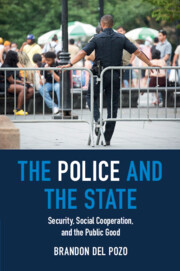Book contents
- The Police and the State
- The Police and the State
- Copyright page
- Contents
- Introduction
- Chapter 1 The Role of the Police
- Chapter 2 The First Power of the Police
- Chapter 3 The Second Power of the Police
- Chapter 4 The Third Power of the Police
- Chapter 5 Democratic Priorities, Relationships, and Tensions
- Chapter 6 The Bases of, and Reasons for Seeking, Police Legitimacy
- Chapter 7 Procedural Justice in Policing Revisited
- Chapter 8 Policing with Public Reason
- Chapter 9 Policing Populism, Protecting Pluralism
- Chapter 10 Primary Goods, Policing States in Transition, and Natural Experiments
- References
- Index
Chapter 1 - The Role of the Police
Published online by Cambridge University Press: 17 January 2023
- The Police and the State
- The Police and the State
- Copyright page
- Contents
- Introduction
- Chapter 1 The Role of the Police
- Chapter 2 The First Power of the Police
- Chapter 3 The Second Power of the Police
- Chapter 4 The Third Power of the Police
- Chapter 5 Democratic Priorities, Relationships, and Tensions
- Chapter 6 The Bases of, and Reasons for Seeking, Police Legitimacy
- Chapter 7 Procedural Justice in Policing Revisited
- Chapter 8 Policing with Public Reason
- Chapter 9 Policing Populism, Protecting Pluralism
- Chapter 10 Primary Goods, Policing States in Transition, and Natural Experiments
- References
- Index
Summary
Before proceeding to a detailed account of the powers of the police and the means to justify their exercise, this chapter describes key political features of the police role. Ultimately, the role is to impartially produce a unique form of practical, substantive justice among citizens, one that they are owed by the state as they encounter physical hazards, interpersonal conflicts, or are subject to behaviors that the law empowers the government to regulate. The role is derived here by a form of bootstrapping, in that it takes a broad survey of what we observe the police do when aspiring to its positivist ideals, distills it into categories, and then describes the political nature of each grouping. In doing so, it concludes policing’s practical, substantive justice consists of protection and rescue from physical harm, the collection of people and evidence for presentation to a magistrate in matters of criminal law, and the brokerage and enforcement of the fair terms of social cooperation in public spaces.
- Type
- Chapter
- Information
- The Police and the StateSecurity, Social Cooperation, and the Public Good, pp. 5 - 25Publisher: Cambridge University PressPrint publication year: 2022

